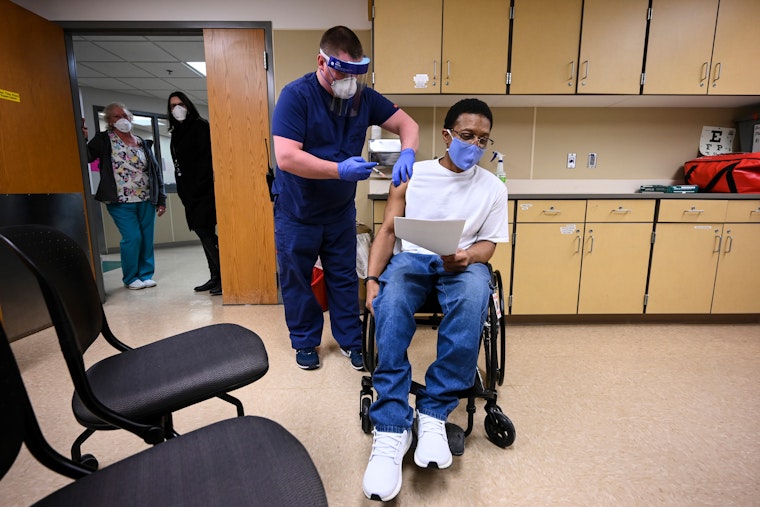Prisons and Jails Should be Prioritized for the Coronavirus Vaccine
By Maïté De Rue

Fair access to COVID-19 vaccines—including who should be first in line—has been debated in many countries around the world. The combination of massive need and short supply requires authorities to define priorities. In doing so, they should ensure “the equitable protection and promotion of human well-being among all people of the world,” a standard put forward by the WHO. In this context, whether prisoners should be considered a priority group becomes an urgent question.
As we know, prisons conditions make them particularly vulnerable in facing this pandemic, with the spread of the virus facilitated by overcrowding, bad material conditions of detention, unsatisfactory healthcare services in prisons, and higher rates of pre-existing medical conditions among prison population. While some countries tried to reduce the number of prisoners and secure physical distance in prisons in Spring 2020, the situation remains critical in numerous places, with many prisons emerging as hotspots. As of February 1, the NGO Prison Insider reported that more than 504,000 prisoners in 121 countries were COVID-positive, and more than 3,800 prisoners in 47 countries have died from the virus. In the U.S., one in five prisoners (state and federal combined) has tested positive for the virus, according to non-profit group the Marshall Project. Recent news reports indicate that infections behind bars have also skyrocketed in other countries including Canada, the UK, France, Spain, Pakistan, and Malaysia.
Researchers at the University of Oxford and hundreds of American health experts have stressed the need for prisoners to be among the first groups to be vaccinated, which aligns with the recommendations from various UN and Council of Europe bodies. The UN High Commissioner for Human Rights has stressed that “affordable and non-discriminatory access to the vaccine is a human right,” while the Committee on Bioethics of the Council of Europe has recalled the principle of equitable access to healthcare. The UN Committee on Economic, Social and Cultural Rights has similarly highlighted that governments have an obligation to provide vaccines for groups that are at high risk of contagion, such as incarcerated people.
Under international law, vaccinating prison populations is an obligation that falls to the government. The right to health is a fundamental right also internationally recognized as belonging to prisoners. States are obligated to account for the treatment of people deprived of their liberty, and must take appropriate steps to safeguard their lives and health. This includes ensuring protection against transmissible diseases, and therefore access to the COVID-19 vaccine. In addition, strong measures taken in places of detention are necessary to control COVID-19 in the broader community.
Yet not all countries have included incarcerated populations in first phases of vaccinations. In the U.S., which has the highest rate of incarceration globally, the federal Bureau of Prisons announced it would prioritize prison staff, but not inmates, while approaches among U.S. states are very diverse. In France, the head of the National Preventive Mechanism has urged the government to adopt a specific vaccination strategy for prisons, but authorities have said that they will apply the same rules as for general population. Some states remain undecided, such as Ireland, where the prison service has requested that prisoners to be considered as priority, but the government has yet to decide. Meanwhile, other countries seem ready to take a more proactive approach, which, unfortunately, has exposed them to internal controversy. For example, the Canadian government’s decision to prioritize prisoners for vaccination prompted heavy criticism from the Conservative opposition party. In Israel, after intense controversy sparked by the Public Security Minister, the government has confirmed that all inmates will be vaccinated as of January. In other countries, the question does not seem to emerge in debates on vaccine prioritization, with the risk that people deprived of liberty would be left behind.
No one single method for vaccine prioritization suits every global context. Each country must choose based on its own situation and according to factors, including available vaccines, the benefit-risk assessment for different population groups, the amount and pace of vaccine supply, the situation in hospitals and healthcare systems, and the economic and social impact of the pandemic. However, in the face of difficult choices, Dr. Tedros, the head of the WHO, has urged world leaders to unite behind abandoning the “me-first approach” to the COVID-19 vaccination. This logic should apply equally to prisons and jails, where, around the world, the virus has already wreaked a horrific toll. No sentence should cost an individual their life or lead to preventable health complications.
Maïté De Rue is a legal officer for national criminal justice reform with the Open Society Justice Initiative, where she focuses on criminal justice reforms, and in particular prosecutorial independence and accountability.